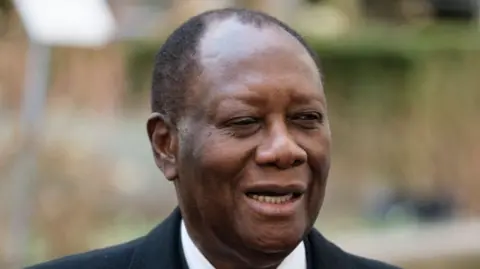Angola Fuel Protests: Hundreds Arrested Amid Deadly Demonstrations
Angola Erupts: Taxi Strike Ignites Nationwide Protests
**Did you know that a seemingly simple taxi strike in Angola sparked one of the most significant and violent protests in recent years?** This isn't just a news story; it's a glimpse into the simmering frustrations of a nation grappling with economic hardship and decades of political power.
 A Nation's Fury Ignites
The scene in Luanda was chaotic. Imagine the air thick with tension, the roar of angry crowds echoing through the streets. Roads became impassable mazes of overturned vehicles, the stench of burning tires filling the air. Shops were looted, their windows shattered like broken promises. The clash between protestors and police was brutal, a stark visual representation of a nation's boiling point. Four people lost their lives, and over 500 were arrested in the wake of the escalating violence.
A Nation's Fury Ignites
The scene in Luanda was chaotic. Imagine the air thick with tension, the roar of angry crowds echoing through the streets. Roads became impassable mazes of overturned vehicles, the stench of burning tires filling the air. Shops were looted, their windows shattered like broken promises. The clash between protestors and police was brutal, a stark visual representation of a nation's boiling point. Four people lost their lives, and over 500 were arrested in the wake of the escalating violence.
 This wasn't just about rising petrol prices; the 33%+ diesel hike was merely the match that ignited a powder keg of long-simmering discontent.
The Last Straw: Fuel Prices and Deeper Issues
This wasn't just about rising petrol prices; the 33%+ diesel hike was merely the match that ignited a powder keg of long-simmering discontent.
The Last Straw: Fuel Prices and Deeper Issues
 The Angolan government's decision to remove fuel subsidies, while seemingly a necessary economic step in this oil-rich nation, had devastating consequences. The price of essential goods skyrocketed. For many Angolans, already struggling to survive on an average monthly wage of just $75, it was the final blow. This situation highlights the growing disparity between the wealthy elite and the impoverished masses. Even the presidential promise of a wage increase to $100 hasn't materialized, fueling the fire.
Activist Laura Macedo eloquently captured the sentiment: *"The fuel price issue is just the last straw... People are fed up. Hunger is rife, and the poor are becoming miserable."* Her words resonate with the countless Angolans who took to the streets.
The Angolan government's decision to remove fuel subsidies, while seemingly a necessary economic step in this oil-rich nation, had devastating consequences. The price of essential goods skyrocketed. For many Angolans, already struggling to survive on an average monthly wage of just $75, it was the final blow. This situation highlights the growing disparity between the wealthy elite and the impoverished masses. Even the presidential promise of a wage increase to $100 hasn't materialized, fueling the fire.
Activist Laura Macedo eloquently captured the sentiment: *"The fuel price issue is just the last straw... People are fed up. Hunger is rife, and the poor are becoming miserable."* Her words resonate with the countless Angolans who took to the streets.
 The Government's Response: Denial and Crackdown
President João Lourenço dismissed concerns, claiming diesel prices in Angola remain incredibly low compared to the global average. But is this argument enough for a population struggling to put food on the table? The government's response was swift and forceful. State-run media largely ignored the protests while the MPLA warned against participation, branding the demonstrations as "acts of vandalism."
The Government's Response: Denial and Crackdown
President João Lourenço dismissed concerns, claiming diesel prices in Angola remain incredibly low compared to the global average. But is this argument enough for a population struggling to put food on the table? The government's response was swift and forceful. State-run media largely ignored the protests while the MPLA warned against participation, branding the demonstrations as "acts of vandalism."
 This heavy-handed approach only fueled the flames of public outrage. The government's claims are questionable, especially considering the widespread suffering and the protests expanding to other cities like Huambo.
A Divided Nation: Who's Really to Blame?
This heavy-handed approach only fueled the flames of public outrage. The government's claims are questionable, especially considering the widespread suffering and the protests expanding to other cities like Huambo.
A Divided Nation: Who's Really to Blame?
 The taxi drivers’ three-day strike, initially the catalyst, soon morphed into something far larger. While the major taxi association, Anata, distanced itself from the violence, many believe the protests are a symptom of a deep-seated distrust in the government and its long-standing rule. What will happen next?
The question remains: Will the government address the root causes of this unrest, or will the cycle of protest and repression continue? The future of Angola hangs precariously in the balance. Will the people of Angola find their voice and secure a better future? Stay tuned for updates as this critical situation unfolds.
**Keywords:** Angola protests, Luanda protests, fuel price hike, Angola economy, Angolan politics, MPLA, João Lourenço, social unrest, political instability, African protests, economic inequality.
The taxi drivers’ three-day strike, initially the catalyst, soon morphed into something far larger. While the major taxi association, Anata, distanced itself from the violence, many believe the protests are a symptom of a deep-seated distrust in the government and its long-standing rule. What will happen next?
The question remains: Will the government address the root causes of this unrest, or will the cycle of protest and repression continue? The future of Angola hangs precariously in the balance. Will the people of Angola find their voice and secure a better future? Stay tuned for updates as this critical situation unfolds.
**Keywords:** Angola protests, Luanda protests, fuel price hike, Angola economy, Angolan politics, MPLA, João Lourenço, social unrest, political instability, African protests, economic inequality.

Image 1

Image 2

Image 3

Image 4

Image 5

Image 6
Comments
Post a Comment